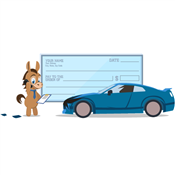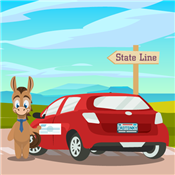Roadside Assistance Coverage
Think of roadside assistance as added protection for you and your car. When something goes wrong, help is at the ready. But what type of coverage is best? Check out our roadside assistance provider comparisons.
 |
| © CreditDonkey |
What Is Roadside Assistance?
Roadside assistance provides emergency service to your car in situations that don't involve an accident. That can mean anything from mechanical issues like a dead battery to locking yourself out of your vehicle.
Basically, if your car is not drivable for most reasons (not including an accident), roadside assistance will help. The goal is to make your vehicle drivable again. If that's not possible, it will be towed to the nearest auto repair shop.
Basic roadside assistance includes services like:
- Towing and labor
- Flat tire changes
- Battery jump-start
- Lockout or locksmith services
- Fuel delivery
- Required fluids, like oil and water
- Winching or extrication service to dislodge your vehicle
- Minor mechanical repairs and adjustments
There are 2 types of plans: one that covers you as the driver, regardless of what car you are driving, and another that covers the vehicle, no matter who's driving. It's important to know which plan you have to ensure you have coverage in all driving situations.
How Does Roadside Assistance Work?
With most roadside assistance coverages, you are given a toll-free number to call for help. Others also offer access through a mobile phone app or website.
You'll be asked to provide a few details about your location and the type of assistance you need. Help is then dispatched while you receive an estimated time of arrival.
Most providers work with a network of companies that provide emergency roadside services. This ensures help is as close to your location as possible to minimize wait time.
Your roadside assistance plan pays the cost of covered services to your vehicle. You pay for any work performed that is excluded from your plan or goes beyond your coverage limitations.
Some roadside assistance providers require you to pay the bill upfront and then submit it for reimbursement. Others require you to file a claim, which it will then pay based on your plan's coverage. You receive a bill for costs not covered under your plan.
How Much Is Roadside Assistance?
Roadside assistance coverage varies significantly based on the type of provider. Auto insurance companies usually provide the cheapest coverage, while auto clubs are the most expensive. You can also find other providers as well (more on that below).
- Auto insurance companies: around $3 per month. Your insurer will include the cost in the total amount of your policy.
- Mobile phone service providers: around $4 per month. (Not offered by all companies; cost is per line.)
- Automobile associations: roughly $50 per year. This includes the membership fee to join.
- Credit card issuers: around $55 a year. Some premium credit cards include free, though limited, roadside assistance coverage.
Roadside assistance insurance is usually worth it IF you:
- Own an older car
- Have a long daily commute or frequently drive long distances
- Don't know how to change a tire or jump-start a battery
- Do a lot of nighttime driving (when most auto repair shops are closed)
- Want peace of mind when driving your vehicle
Is There Free Roadside Assistance?
You can get free roadside assistance in several ways. In fact, it may already be included in services you already have. These include:
Credit Cards
A few companies offer free roadside assistance as a customer benefit. Information about the service is included in your credit card agreement. You can call also your credit card's customer service number for more info, including exclusions and towing mile limits.
Vehicle's Warranty
Most new vehicles in the U.S. include free roadside assistance. The manufacturer's benefit is provided until the basic warranty expires.
Auto Insurance Company
If you have a Chubb auto insurance policy and add bodily injury indemnification coverage, you get free roadside and towing assistance.
What Is the Best Roadside Assistance Plan?
You can get roadside assistance coverage from a variety of sources, including auto insurance companies, auto clubs, your car manufacturer, credit card issuers, and even mobile phone providers.
In general, your auto insurance policy offers the better value for the price. Auto insurers usually offer the same benefits as pricier auto clubs. And in some cases, the roadside assistance coverage is better.
Here's a quick example: With some auto clubs, towing is limited to up to 100 miles. State Farm and Progressive, among other insurers, tow to the nearest repair shop, with no towing mileage limit.
Read on for some other benefits and drawbacks to purchasing roadside assistance through your auto insurance.
Pros
- Coverage usually costs less than auto clubs and credit card plans.
- The cost is spread out over the length of your policy.
Cons
- The cost is based on the age of your car and your driving history.
- Some insurers require you to carry comprehensive or collision coverage to buy roadside assistance coverage.
- Some insurers raise auto insurance rates if you use roadside assistance three or more times a year.
Which Insurance Companies Offer Roadside Assistance?
 |
| © CreditDonkey |
All major nationwide auto insurance companies offer roadside assistance coverage. It is usually an optional, add-on coverage to your policy. Allstate, however, offers pay per use and membership plans in addition to the add-on coverage.
While plans vary greatly among insurers, the best insurance companies for roadside assistance includes these benefits:
- Free towing
- Unlimited towing mileage or a 100 miles or higher limit
- Free or high limit amounts for fuel and locksmith services
- Service available throughout the U.S. and internationally
- Trip interruption services
- Quick response times
Keep reading to learn more about several popular plans.
Progressive Roadside Assistance Coverage
Progressive offers 24/7 roadside assistance coverage through a nationwide roadside assistance service provider. Its coverage applies to autos, motorcycles, and RVs as well as vehicles used for towing or hauling your boat or other vehicles.
Some roadside assistance services are only available along with certain coverages, such as comprehensive, collision, rental reimbursement, or medical payment.
Progressive views each roadside assistance call as a claim, which could affect your renewal rate. The insurer can even cancel or not renew your policy if you have an excessive number of roadside assistance calls. You may also be charged after a certain number of calls.
State Farm Roadside Assistance Coverage
State Farm offers 24/7 emergency road service coverage. It sells the service as Coverage H on its policy for about $5 a year.
If you don't want to add the coverage to your policy, you can pay a negotiated flat rate for roadside assistance. This rate is generally lower than the average market price.
State Farm does not provide coverage for towing your vehicle beyond the nearest auto repair facility.
GEICO Roadside Assistance Coverage
GEICO offers 24/7 emergency road service. You can get help either online, by phone, or through the GEICO mobile app.
The roadside assistance coverage costs about $14 a year per car. Emergency road service is only available for GEICO auto insurance policyholders.
Generally, it's faster to contact GEICO emergency roadside services through its mobile app; the app sends your exact location to the dispatcher and you get an estimated time when help will arrive.
USAA Roadside Assistance Coverage
USAA offers 24-hour roadside assistance coverage as part of its optional towing and labor coverage. The coverage can be either added at the time of policy purchase or later on.
USAA roadside assistance coverage costs about $13 per year. The company partners with a nationwide roadside assistance service provider to provide such services to its policyholders.
The coverage extends throughout the U.S. and internationally. USAA may reimburse you for tows over 11 miles and other roadside assistance services paid out of pocket, but restrictions apply.
Other Ways to Get Roadside Assistance Coverage
Roadside assistance through your auto insurer may provide the best value, but it's not the only way to get that coverage. Check out the pros and cons of other roadside assistance providers.
Auto Clubs
Auto clubs like AAA are a popular choice for roadside assistance.
Pros:
- Membership offers other perks and discounts.
- Good value for those who drive a lot.
- Fewer limitations compared to other roadside assistance plans.
Cons:
- Membership (and a yearly fee) is required.
- Membership fees start at $40 and more a year.
Car Manufacturer
Most automakers offer service with a new vehicle purchase.
Pros:
- It's usually free.
- All basic roadside assistance services are provided.
Cons:
- Typically in effect for up to five years or 100,000 miles
- Service is only for the specific vehicle (not the driver)
- Must stay within the car manufacturer's network of dealerships and auto repair shops
- Service may not be available in all geographic areas.
Credit Card
Certain credit cards offer roadside assistance to cardholders.
Pros:
- Service automatically available when the card is issued.
- Some credit cards come with free coverage.
Cons:
- Only some platinum or elite credit cards offer the benefit.
- The roadside assistance benefit is generally pay-per-use.
- Free roadside assistance usually limited to a certain dollar value per call.
Cell Phone Provider
Some mobile phone service providers offer roadside assistance.
Pros:
- A low monthly cost, usually under $5.
- Vehicle is covered if your phone is with you.
Cons:
- The monthly cost is per line.
- Enrollment in a plan may be required.
- Limits on how many times per year you can use the service.
Some Things to Consider Before Deciding
Here are some things to look for when searching for the best roadside assistance plan:
Who Is Covered?
The best roadside assistance service covers your car, not the driver. This ensures anyone driving your car is covered under the plan. However, if you're the only driver of your car and you drive other cars a lot, like rentals, the best plan for you might be one that covers the driver only.
Other Vehicles Coverage
The best plans provide coverage to alternate vehicles, like when you rent a car or borrow someone else's car when yours is being serviced.
Limitations
Most plans have towing limits. The best roadside assistance plans allow for more than one tow per year. Also look at distance limitations. You want a plan that will tow your vehicle beyond a three-mile maximum.
Exclusions
With some plans, basic services do not include winching or extrication services or minor mechanical repairs. The best emergency roadside assistance offers any service needed to make your car drivable.
Extra Charges
Check for extra fees for services. For example, some provide emergency fuel delivery, but you have to pay for the fuel. Other plans charge you to tow your car to a repair center of your choice rather than the nearest one.
Bottom Line
You've got plenty of options when shopping for roadside assistance coverage. Be careful of cheaper plans — the services provided may be too limited. That could mean paying out-of-pocket in an emergency.
Your car insurance company is a good place to start when considering coverage. In many cases, they offer the best value.
Write to Maryellen Cicione at feedback@creditdonkey.com. Follow us on Twitter and Facebook for our latest posts.
Read Next:






